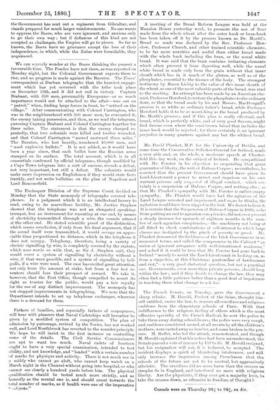We can scarcely wonder at the Boers thinking the present
a favourable time. The Pondos have not risen, as was reported on Monday night, but the Colonial Government expects them to rise, and no progress is made against the Basutos. The Times' correspondent at Durban telegraphs that the heaviest engage- ment which has yet occurred with the tribe took place on December 13th, and it did not end in victory. Captain Brabant, with 650 men, presumably Europeans—or so much importance would not be attached to the affair—was out on "patrol," when, finding large forces in front, he "retired on the village." After communicating with Colonel Carrington, who was in the neighbourhood with 500 more men, he evacuated it, the enemy taking possession, and then, as we read the telegram, pursuing Captain Brabant and Colonel Carrington together for three miles. The statement is that the enemy charged re- peatedly, that two colonials were killed and twelve wounded, and that Colonel Carrington "moved eastward three miles." The Basutos, who lost heavily, numbered 10,000 men, and
used explosive bullets." It is not added, as it would have been a year since, that each bullet bore the Russian arms stamped on its surface. The total account, which is in all esssentials confirmed by official telegrams, though modified by a Cape Town telegram into a sort of success, reveals a defeat, not very important, but still a defeat. The colonists would make more impression on Englishmen if they would state facts frankly, and not write bulletins on the plan of Napoleon and Lord Beaconsfield.


































 Previous page
Previous page